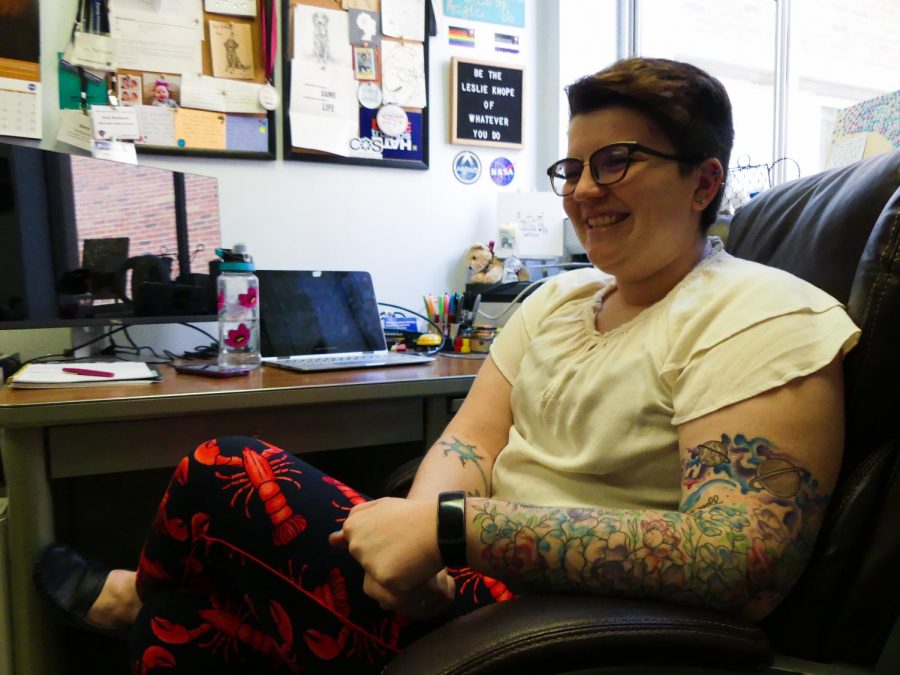Doctoral candidate creates food pantry for students
Box in Johnson Tower 217 holds apple sauces, single-serve macaroni, soups
JACOB BERTRAM | THE DAILY EVERGREEN
Amy Nusbaum, a WSU doctoral student in the psychology department, runs a food pantry for food insecure students from her office in Johnson Tower. In the state of Washington, Whitman County ranks highest for food insecurity, according to a 2016 feeding America report.
March 25, 2019
A doctoral candidate in psychology started a free food pantry for students outside of her office last semester, and after a call to action on social media earlier this month, has free food available for students coming to her office.
Amy Nusbaum said she first came up with the idea to place free food for students outside her office after reading a recent research study, which detailed food insecurity as a growing issue on college campuses.
A box outside her office in Johnson Tower, Room 217, holds food items such as apple sauces, single-serve macaroni and soups, bags of chips and granola bars. Above it a sign reads, “Hungry? Take what you need.”
Whitman County is the most food-insecure county in Washington state, according to a 2016 Feeding America report, with 19.7 percent of the population, or roughly 9,300 people, facing food security issues.
Nearly half of all college students deal with food security issues, according to a 2017 study in Educational Researcher. Of 30,000 four-year and two-year university students surveyed, almost half were food insecure.
Another study by the same researchers has positively linked food insecurity to lower graduation rates among college students. That study defines food insecurity as the uncertain or limited availability to acquire nutritional food.
Nusbaum said her pantry started small. She began leaving small snack items like granola bars and fruit snacks outside her office, which she would pick up when she went to the grocery store. Before spring break, she came up with the idea of starting an Amazon wish list and promoting it on her social media.
A couple days after posting the link to the wish list on Facebook and Twitter, Nusbaum returned home to find her porch overflowing with Amazon boxes of donated food. Some came from her friends and family and others from WSU colleagues and community members. Since the initial surge of donations, Nusbaum said she still receives packages every couple of days.
“I really thought that it was going to be like a couple of things trickling in, and that would have been fantastic also, but just the overwhelming support is incredible,” Nusbaum said.
Nusbaum’s pantry is one of several available to students on the Pullman campus, including the TRIO Student Support Services Program Food Pantry in the Lighty Student Services Building, Room 260 and Rosario’s Place in the Women*s Center.
Several campus initiatives have sought to reduce food insecurity on the Pullman campus and greater community, like the Cougs Feeding Cougs initiative, which was started in spring 2017.
Cougs Feeding Cougs is an emergency fund that students can access for quick cash to buy food at on-campus locations.
Nusbaum said she hopes her pantry can serve a different need for students compared to other pantries on campus. She said it is not meant as a place to serve long-term food insecurity needs, like large food banks with canned goods, but is instead meant to supplement student’s food needs throughout the day.
“What I really envisioned was students who are on their way to classes and forgot to pack lunch,” she said. “So less of the students who need long-term support and more of, ‘We don’t want students to go hungry during the day.’ ”





















